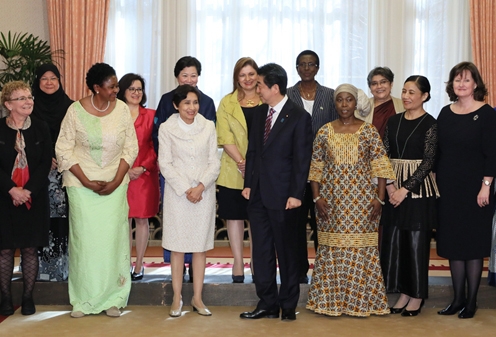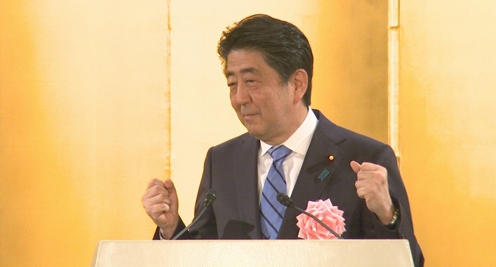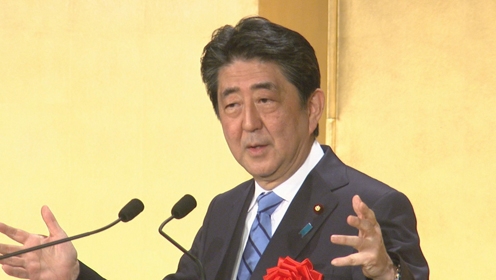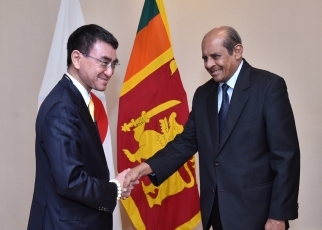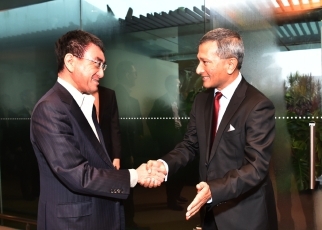Luncheon for Female Ambassadors to Japan
Cabinet Secretariat, Tuesday, January 9, 2018
[Provisional Translation]
On January 9, 2018, Prime Minister Shinzo Abe hosted a luncheon at the Prime Minister’s Official Residence for female ambassadors accredited to Japan.
2018 New Year Party Jointly Hosted by the Three Economic Associations
Cabinet Secretariat, Friday, January 5, 2018
[Provisional Translation]
On January 5, 2018, Prime Minister Shinzo Abe attended the 2018 New Year Party jointly hosted by the three economic associations held in Tokyo.
The Prime Minister said in his address,
“I wish you all a very happy New Year. I am deeply pleased to see today’s New Year Party hosted by the three economic associations held with such excitement and grandeur as well as attended by truly so many people.
While I normally bring a speech prepared, today I did not bring one with me. Please allow me to speak as I would like to.
Today’s party has been a truly lively event, with so many guests attending, including H.E. Mr. William Hagerty, Ambassador of the United States to Japan. It makes me hope that we will have a strong economy once again this year.
I saw on the news that 6,000 people were lined up before the opening of a department store in the Kansai area, and that sales of luxury goods were good and overall sales were up 5 percent. At department stores in Tokyo as well, extremely expensive fukubukuros, New Year’s ‘lucky’ bags with items sold at discounted prices, the kind that Chairman Sakakibara of Keidanren (Japan Business Federation) might purchase, have sold very well. At these department stores sales were also up more than 5 percent. I believe this is the result of four consecutive years of the highest levels of wage increases since the beginning of this century. There is the saying that the economy is a reflection of people’s sentiment. As this saying goes, people are gradually feeling more upbeat about the economy. At the same time, I also believe that expectations about an even better economy this year also motivated people to go to department stores.
Having said that much, you probably are aware of what I am going to say next. In order to ensure the continuation of this positive cycle of the economy, frankly speaking I would like to request a 3 percent increase in wages this year. Since not many of you raised your voices, I take it to mean that there is no opposition to my proposal.
On January 2, I played golf with Chairman Sakakibara. I have only played once this year, but I got my best score. Mr. Sakakibara was also on a roll. The balls he hit with his driver flew more than 3% farther than the last time without a doubt. Actually, last year I also had an opportunity to play golf with Chairman Kobayashi of the Japan Association of Corporate Executives as well. Mr. Kobayashi also had power and was on a roll. The two of them use different golf shafts. One set is made by Toray Industries, and the other set is made by Mitsubishi Chemical Corporation, so there are differences between the two. I will not say which one is better; both are great. I have high hopes that the momentum of these two individuals who have led the global golf shaft market will be directed at increasing wages.
This year marks the 150th anniversary of the start of the Meiji era. Eiichi Shibusawa, who was active during that era, has been quoted as saying: the moment you are satisfied is the moment that you become weak. I would like to ask you to continue new investments without being satisfied with your record high profits. In preparation for the internet of things (IoT), robotics, artificial intelligence (AI), and as Chairman Sakakibara mentioned earlier, Society 5.0, I hope you will aim at making your companies lead the world. Of course, we on our part will not only make such requests. As part of our policy package that we promised following last year’s general election, we will lower the corporate tax burden to 20 percent for those ambitious companies that boldly invest in the future. This was quite a bold decision that we made. Deputy Prime Minister Aso made this decision, with the same resolve as if he was jumping down from the renowned high-rise stage at Kiyomizu Temple in Kyoto, albeit with a parachute of course. I hope that everyone will take advantage of this scheme.
Today we are also joined by politicians, including Mr. Noda, Mr. Oguchi, Minister Suzuki, and Minister Kamikawa. Everyone seems refreshed and invigorated. This is probably thanks to the fact that the general election was conducted without incident last year. We achieved a tremendous victory, securing 284 seats. I do believe everyone here supported the ruling parties. Of the three general elections that I have been involved in as President of the Liberal Democratic Party of Japan (LDP), we received the largest number of votes in both proportional representation constituencies and single-seat constituencies in this last election. In other words, we now bear a greater responsibility than ever before, and so I intend to exert every effort to fulfill the promises we made during the election campaign one by one.
As the market adage goes, ‘the years of the monkey and the rooster are years of upheaval.’ Last year was the year of the rooster, and it was indeed a year of upheaval. However, the adage also states that ‘the year of the dog is a year of laughter.’ I think that more or less was the atmosphere in the markets yesterday. I would like to close my New Year’s remarks by expressing my hope that this coming year will be a wonderful and bright year for everyone here and for Japan, and by pledging to do everything in my power to make sure that it is. Happy New Year.”
Jiji Press New Year Party
Cabinet Secretariat, Friday, January 5, 2018
[Provisional Translation]
On January 5, 2018, Prime Minister Shinzo Abe attended the Jiji Press New Year Party held in Tokyo.
The Prime Minister said in his address,
“Happy New Year everyone. This year, on my way to visit Ise Jingu, I saw Mt. Fuji distinctly out the window of the Shinkansen, suggesting to me that many good things will happen this year. I actually started with a similar remark last year, but it was an eventful year.
Last year was the year of the rooster. There is the saying that the years of the monkey and rooster are ones of upheaval; last year was indeed a year of upheaval. In fact, last year, at this occasion, I stated that the year of the rooster is a year when there are various changes in politics. I touched upon the dissolutions of the House of Representatives by former Prime Minister Koizumi and former Prime Minister Sato, both of which took place in the year of the rooster. However, it looked like no one here was aware of the true intention behind my remarks. Despite my advance notice at the beginning of last year, the media criticized that snap election when I actually dissolved the House of Representatives in October. It made me wonder what the media were listening to in my speech. They said that there was no cause for an election. If they were to claim that there was no cause for it, I wished they would have said so at the beginning of the year. A newspaper company, which is quite critical of me--actually there are many which are critical--put out an editorial stating that I had suggested a dissolution at the start of the year and the opposition parties should have taken my remarks seriously and made preparations to that end. It stated that now, attention will be on what I will say at the beginning of this year. I have come here promising myself that I absolutely would not make such statements today.
This year is the year of the dog. Sixty years ago, Tokyo Tower was just completed. I was four years old at the time. It was the year that my father was first elected to the Diet. From what I recall, I went to a celebratory event commemorating the opening of Tokyo Tower. The reason I remember that is because I brought home a box of popcorn for some reason. It may have been a giveaway at the event. That was the first time I ate popcorn in my life. I remember being both amazed that there was such a delicious food in the world and, even as a child, proud and excited at the completion of the world’s tallest tower. Following that, there was the Osaka Expo in the year of the dog in 1970, and the Tohoku Shinkansen was completed in the subsequent year of the dog. I think we can say that the year of the dog is often a year of new beginnings.
I hope to make this a year that people will see as the start of a new era. I would like everyone to take time and think hard about what this year should entail. Fundamentally, I will embark on efforts by giving top priority to the economy. As the market adage goes, ‘the years of the monkey and the rooster are years of upheaval, while the year of the dog is a year of laughter.’ Fortunately, yesterday and today there has been a little bit of something to smile about in the markets. I will continue to move forward resolutely with policies to exit from deflation.
We are joined here today by politicians. I notice that everyone is attending with a refreshed look on their face. I think this must be because the election was conducted without incident before the end of last year. How one feels about the election may differ depending on the political party. Thanks to that election, it is now possible for us to undertake a major shift to a social security system oriented to all generations. In addition, I believe we are able to create a large policy package that will secure a permanent source of funds totaling 2 trillion yen every year because we earned the public’s mandate by holding the election. In last year’s general election, the public gave us a tremendous number of parliamentary seats. I have been involved in three general elections as President of the Liberal Democratic Party of Japan (LDP), and we won the largest number of votes in this third general election, in both proportional representation and single-seat constituencies. What that means is that we now bear a greater responsibility than ever before. I would like to make this a year in which we fulfill each of the promises we made one by one with a sense of urgency. I will exert every effort in the upcoming session of the Diet.
Seated right in front of me is H.E. Mr. Cheng Yonghua, Ambassador of the People’s Republic of China to Japan. This year marks the 40th anniversary of the Treaty of Peace and Friendship between Japan and the People’s Republic of China. I also want to make this a year that the people of both countries can recognize that the Japan-China relationship improved significantly as it is the treaty’s 40th anniversary. In terms of diplomacy, we have a considerable responsibility to protect the people of Japan from the North Korean threats. In addition, with regard to the Japan-Russia relationship, this year President Putin will run in the presidential election. In May, I will visit Russia and seek to make any possible progress with the peace treaty negotiations in order to resolve the territorial issue between our two countries. On economic partnership agreements (EPAs), I will work hard to ensure that signatures of the TPP11 are attained. I will continue to make use of EPAs, which will serve as new engines for Abenomics, in cementing economic growth.
In promoting economic growth, the biggest issue is whether wages will increase this spring. Earlier I exchanged a firm handshake with the President. My feelings have been conveyed to the President. I hope everyone at Jiji Press will have something to be pleased about. I think that wages may rise by 3 percent. I expect that if this goes well, we will continue to see a positive economic cycle.
I would like to close my New Year’s remarks by wishing everyone a successful year in 2018. Thank you very much.”
Japan-Sri Lanka Foreign Ministers’ Meeting
Foreign Affairs, Friday, January 5, 2018
On Friday, January 5, from 1:00 p.m. (local time) for approximately 90 minutes, Mr. Taro Kono, Minister for Foreign Affairs, on his visit to Sri Lanka, held a meeting over lunch with the Hon. Tilak Marapana, Foreign Minister for the Democratic Socialist Republic of Sri Lanka. The overview is as follows.
Minister Kono, noting that his visit to Sri Lanka is the first by a Japanese foreign minister in approximately 15 years, stated that Japan places utmost importance on its relationship with Sri Lanka which is located in a strategic point on the Indian Ocean Sea Lanes and seeks to further enhance bilateral relations. Minister Marapana welcomed the visit by Minister Kono and stated that Sri Lanka also seeks to strengthen bilateral relations.
Minister Kono explained Japan's Free and Open Indo-Pacific Strategy and expressed his hope to further enhance cooperation in the areas of maritime, security and defense with Sri Lanka, which is at the center of the strategy. He stated that Japan seeks to further promote infrastructure development cooperation to strengthen connectivity of ports and emphasized the importance of openness, transparency and economic viability, as well as financial soundness of the recipient country in the area of infrastructure development. In response, Minister Marapana stated that under the Free and Open Indo-Pacific Strategy proposed by Japan, it is important to ensure freedom of navigation and Sri Lanka seeks to further promote cooperation with Japan in the areas of maritime, security and defense. Minister Marapana hopes for further cooperation in infrastructure development in order to strengthen connectivity.
Minister Kono stated that Japan will enhance cooperation towards the improvement of social infrastructure, including in the areas of environment, terrestrial digital broadcasting and the national reconciliation process. In response, Minister Marapana expressed appreciation for Japan's assistance to date and expressed his hope for further assistance in various areas.
Minister Kono explained the importance of maximizing pressure on North Korea, including through the full implementation of relevant UNSC resolutions, and the early resolution of the abductions issue. Minister Marapana stated that Sri Lanka supports Japan's position on North Korea and will implement relevant UNSC resolutions.
Japan-Singapore Foreign Ministers’ Meeting
Foreign Affairs, Sunday, January 7, 2018
On January 7, commencing at 7:45 a.m. (local time) for approximately 70 minutes, Mr. Taro Kono, Minister for Foreign Affairs, held a meeting with H.E. Dr. Vivian Balakrishnan, Minister for Foreign Affairs, the Republic of Singapore, during his transit stay in Singapore. The overview of the meeting is as follows.
1. The two ministers expressed their appreciation for their friendly bilateral relations, and shared the view to further strengthen relations between Singapore, which is ASEAN Chair this year, and Japan, as well as to work closely together to address the challenges faced by the region and the international community.
2. The two ministers also held an exchange of views on a wide range of subjects, including North Korea, the Middle East, the South Asian countries that Minister Kono visited earlier on this time’s overseas visits, and the world economy.
Press Conference by Foreign Minister Taro Kono
Foreign Affairs, Tuesday, January 9, 2018
Opening Remarks
Visits to Myanmar, the United Arab Emirates, and Canada
Mr. Taro Kono, Minister for Foreign Affairs: If circumstances permit, I am visiting Myanmar, the United Arab Emirates, and Canada during January 11-18.
On the Myanmar visit, I am going to meet with State Counsellor and Foreign Minister Aung San Suu Kyi, and Senior General Min Aung Hlaing, Commander-in chief of the Defence Services, and would like to discuss democratic nation-building in Myanmar as well as improvement of humanitarian and human rights conditions in Rakhine State.
In the United Arab Emirates, I am planning to attend the eighth session of the assembly of the International Renewable Energy Agency (IRENA) and communicate Japan’s advanced initiatives in renewable energy and new energy to the international community. I am also scheduled to meet with Director-General Adnan Z. Amin of IRENA, attendees from various countries, and government officials from the United Arab Emirates.
In Canada, I plan to attend a meeting on North Korea among the foreign ministers of related countries. I held a telephone talk with Foreign Minister Freeland of Canada, this morning to tell her this. At the meeting, I will emphasize the importance of raising the pressure on North Korea to the highest level with solidarity of the international community and maintaining this stance.
North-South High Level Officials’ Meeting
Reporter: I have a question about North Korea. A meeting is taking place today between the Republic of Korea (ROK) and North Korea regarding participation by North Korea in the Pyeongchang Olympics. What type of impact do you expect from this on North Korea’s policy change and other issues?
Minister Kono: I think it is positive that North Korea is expressing its interest in participation because the Olympics are an event for peace. As part of this initiative, it is important to send a firm message from the international community and encourage North Korea’s regime to understand that the future of its current policy is not bright.
Announcement of the ROK’s Approach to the Japan-ROK Agreement
Reporter: The ROK’s Ministry of Foreign Affairs plans to announce measures today based on the results of the taskforce to review the negotiation on the Japan-ROK agreement. Some media sources are reporting that it will ask for additional measures from Japan and this might effectively entail renegotiation. How does Japan intend to respond?
Minister Kono: The Japan-ROK agreement was agreed upon to be “final and irreversible” during the tenure of former Foreign Minister Kishida, and it is highly appreciated by the international community, and thus I believe it is important for both countries to steadily implement the agreement. There is no change to Japan’s stance of urging the ROK to steadily implement the agreement.
Reporter: Regarding the Japan-ROK agreement, how will Japan respond if the ROK expresses its intention to return the 1 billion yen contributed by Japan?
Minister Kono: Japan will not change its stance of urging steady implementation of the Japan-ROK agreement because it is “final and irreversible.”
Reporter: Does that mean Japan would reject this type of request or expression of intent?
Minister Kono: I would like to refrain from answering hypothetical questions.
MEIJI 150th: The Origin of Fundamental Values of Japan
YouTube, Tuesday, January 9, 2018
2018 marks the 150th anniversary of the Meiji period, the origin of Japan’s fundamental values of democracy and the rule of law. More than 500 foreigners contributed to the construction of this modern society.
Foreign Minister Kono Visits Middle East
YouTube, Tuesday, January 9, 2018
A special Sept. 21, 2017 event at Columbia University featuring His Excellency Tarō Kōno, the Foreign Minister of Japan. Opening Remarks by Gerald L. Curtis, Burgess Professor of Political Science Emeritus, Columbia University. Moderated by Takako Hikotani, Gerald L. Curtis Associate Professor of Modern Japanese Politics and Foreign Policy, Columbia University. Closing Remarks by Hugh T. Patrick, Director, Center on Japanese Economy and Business, Columbia Business School. Co-sponsored by the Weatherhead East Asian Institute, the Columbia School of International and Public Affairs, the APEC Study Center, and the Center on Japanese Economy and Business at Columbia Business School.
Emergency Grant Aid for the displaced persons returning to Myanmar
Foreign Affairs, Friday, January 12, 2018
1. On January 12, the Government of Japan decided to extend Emergency Grant Aid of 330 million Japanese Yen (3 million USD) to the Government of Myanmar for assistance of the displaced persons returning to Myanmar from Bangladesh, in accordance with the agreement signed on November 23, 2017 by Myanmar and Bangladesh governments on their repatriation.
2. This Emergency Grant Aid is to provide humanitarian assistance for rebuilding the living condition, including provision of electricity generators, water purifiers, fuel and plastic containers, in the sites for resettlement of the returned displaced persons in the Northern part of Rakhine state in Myanmar.
3. This assistance is to contribute to return and resettlement of the displaced persons assumed to reach up to the thousands or tens of thousands.
Details of the EU Tariff Rates of Industrial Goods under the Japan-EU Economic Partnership Agreement (EPA) Released
METI, Monday, December 25, 2017
The Ministry of Economy, Trade and Industry(METI)hereby announces the details of the tariff rates of industrial goods on the EU side(those related to METI)under the Japan-EU Economic Partnership Agreement(EPA).
For details of the EU's tariff rates under the agreement, see Appendix 1.
References:
Outline of the tariff rates under the agreement in principle
For the outline of both the EU's and Japan's tariff rates of industrial goods under the agreement in principle of the Japan-EU EPA, see Appendix 2.
(Released on November 2, 2017)
Details of Japan's tariff rates under the agreement in principle
For details of Japan's tariff rates of industrial goods under the agreement in principle of the Japan-EU EPA, see Appendix 3.
(Released on November 2, 2017)
Japan's National Greenhouse Gas Emissions in Fiscal Year* 2016(Preliminary Figures)
Ministry of the Environment, Tuesday, January 9, 2018
The Ministry of the Environment and the National Institute for Environmental Studies have released Japan’s National Greenhouse Gas Emissions (preliminary figures) for fiscal year (FY) 2016.
Total emissions in FY2016 were 1,322 million tonnes of carbon dioxide equivalents (Mt CO2 eq.), a 0.2% decrease compared to those of FY2015; a 6.2% decrease compared to FY2013; and a 4.6% decrease compared to FY2005.
The main factor for the lower emissions as compared to FY2015 is the decrease in energy-related CO2 emissions due to wider adoption of renewable energy and resumption of nuclear power plant operation.

























